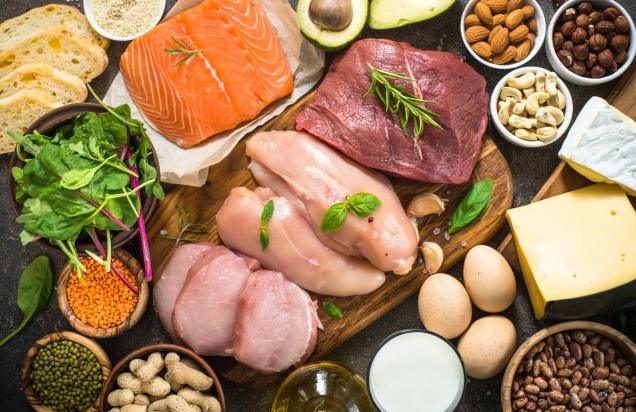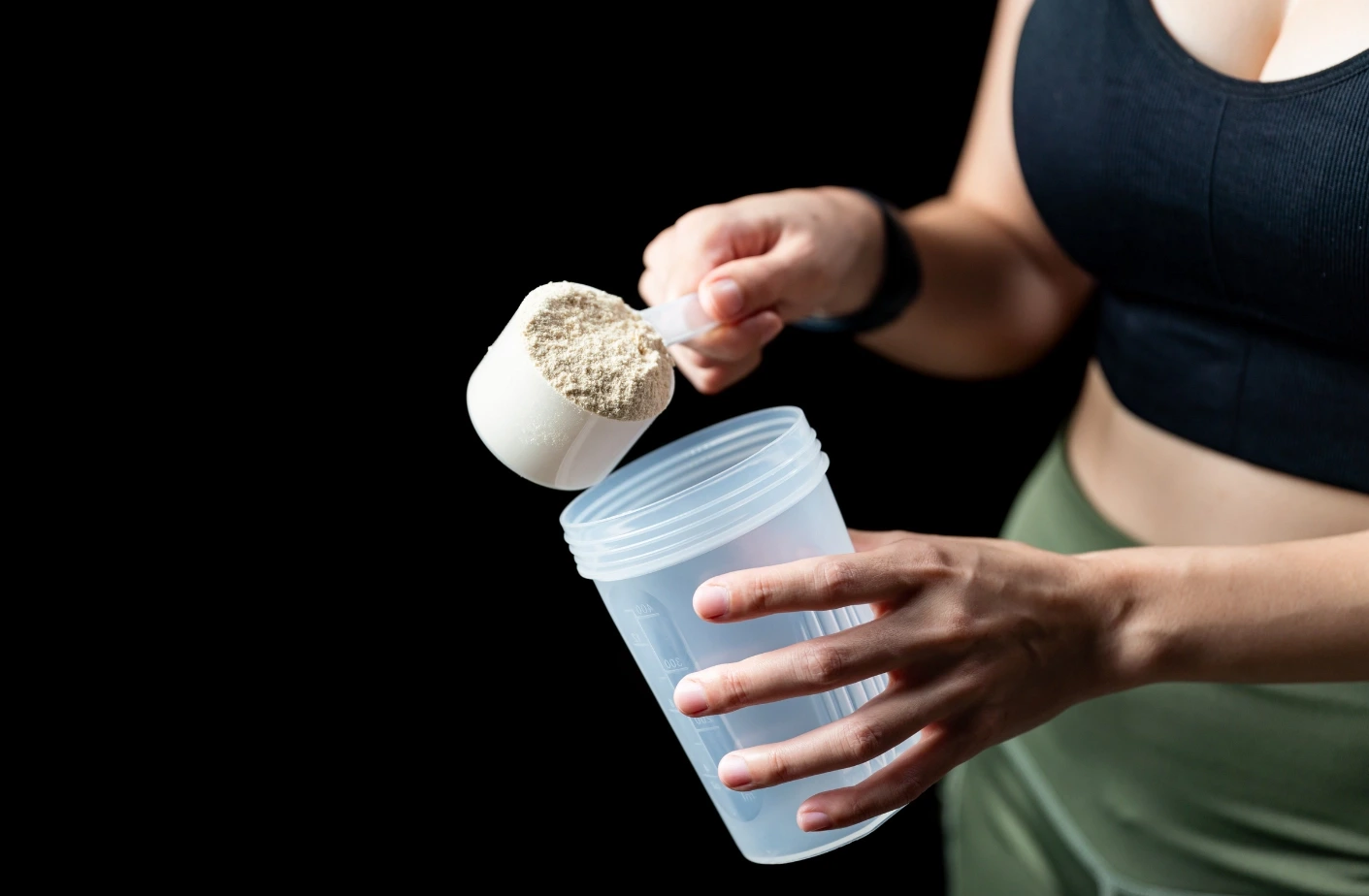Protein plays a key role in women's weight loss, promoting satiety and preserving muscle mass.
For women wishing to lose weight, the recommended protein intake is between 1.5 and 2.0 grams per kg bodyweight per day. This amount optimizes fat loss while maintaining an active metabolism, essential for lasting weight loss and good health.
We'll look at the basics of losing weight, before highlighting the role of protein in weight loss and the right amount to maintain good health. Finally, we'll warn you about certain dieting practices that put users' health at risk.
What's the best way to lose weight?
Weight loss is based on a fundamental principle: the caloric deficit, which occurs when the body expends more energy than it consumes. To understand this mechanism, you need to know your basal metabolic rate, which represents the energy required to maintain the body's vital functions at rest.
For women wishing to lose weight healthily, it is recommended to create a moderate caloric deficit of 300 to 500 calories per day in relation to caloric consumption (basal metabolic rate + physical activity). This approach enables gradual weight loss while preserving muscle mass.
Balanced diet: the key to success
A balanced diet is fundamental to achieving your weight-loss goals. It must include all macronutrients in appropriate proportions:
- proteins (of animal and vegetable origin) play a crucial role in preserving muscle mass;
- complex carbohydrates provide the energy needed for daily activities;
- good quality lipids (fatty acids) are essential for the body to function properly.
It's a good idea to focus on fiber-rich foods like vegetables, which promote satiety and regulate appetite.
Meals should be distributed evenly throughout the day to maintain stable energy levels.

Physical activity: an essential complement
Exercise is a key element in any weight loss strategy. An effective training program should combine :
- weekly sessions of cardiovascular activity (brisk walking, swimming, cycling) lasting 30 to 45 minutes;
- 2 to 3 muscle-strengthening sessions to maintain lean body mass and boost metabolism;
- moderate to high-intensity exercise to optimize energy expenditure.
This combination of activitiesincreases the metabolic rate and promotes fat loss, while preserving muscle tissue.
Please note that this program is only an ideal, and that each person will do what they can according to their age, family and professional situation. The most important thing is to exercise regularly, rather than overdoing it and stopping after just one month.
To optimize your efforts and achieve your weight loss goals, it's vital to understand the specific role of proteins and their optimal quantity, an aspect we'll now explore in greater depth.

How much protein do I need to lose weight?
For women seeking to lose weight, therecommended protein intake is between 1.5 and 2.0 grams per kg of body weight per day, without risk to health(1).
It is particularly important to maintain these intakes during a weight loss phase, as caloric restriction can rapidly lead to protein deficiencies and muscle wasting.
The fundamental role of proteins in the body
Proteins are essential nutrients that play multiple roles in our bodies. They are involved in the renewal of muscle tissue, the formation of hair, nails and skin, and the production of digestive enzymes and hormones.
During a slimming diet, their role becomes even more crucial, as they help preserve muscle mass, which is often damaged by calorie restriction.
Mechanisms of action of proteins in weight loss
Proteins have a remarkable thermal effect: around 30% of their calories are used for their own digestion and metabolism, compared with just 10% for carbohydrates and 3% for lipids. This feature increases daily energy expenditure by 80 to 100 calories, even without additional physical activity.
On a hormonal level, proteins act directly on the satiety hormones, notably by increasing the production of leptin and decreasing that of ghrelin. This regulation naturally reduces calorie intake and curbs cravings, particularly in the evening.
Whey protein: a precious ally for weight loss
Whey protein stands out for its nutritional composition, effectiveness and practicality. With 20 to 25g of rapidly assimilated protein per serving, it has a naturally complete profile of essential amino acids (BCAAs), particularly leucine, crucial for muscle preservation. Its low calorie and fat content makes it an ideal ally for weight loss.

Its superior satiety2 effect compared with other protein sources, combined with its significant impact on metabolism, makes it a particularly effective supplement for weight loss. It not only helps preserve muscle mass during caloric restriction, but also facilitates recovery after physical effort.
To take full advantage of its benefits, it's essential to choose a quality whey with impeccable traceability and no additives or sweeteners that can disrupt metabolism over the long term. The presence of quality certifications and the origin of the milk are decisive criteria.
It can be consumed as a snack between meals, at breakfast or after training, at a rate of 20-25 g of protein per dose, once or twice a day as required.
What behaviours should be avoided?
When it comes to weight loss, certain behaviours can be counterproductive and even dangerous for your health. It's essential to adopt a balanced approach that respects the body's needs while promoting healthy, lasting weight loss.
Avoid the "diet" view in favor of a rebalanced diet
The most common mistake is to adopt a temporary restrictive approach rather than a genuine dietary rebalancing. Drastic diets such as the Dukan diet or other extreme high-protein approaches can lead to a yo-yo effect. We do not recommend them.
It's best to adopt a balanced lifestyle that includes an appropriate intake of proteins (both animal and vegetable), regular physical activity and a varied diet. This rebalancing may take time - from a few weeks to several months - but offers far more lasting results.
Do not excessively restrict calorie intake
Drastically reducing overall caloric intake is a major mistake. The body interprets this restriction as a threat and slows down its metabolism to save energy. This biological protection mechanism can lead to :
- an increase in feelings of hunger;
- nutritional deficiencies;
- muscle loss rather than fat loss;
- chronic fatigue.
For a woman wishing to lose weight, it is recommended to use 300 to 500 kcal less than her daily requirement (basic metabolism + activity).
Limiting the speed of weight loss
Losing weight too quickly (by more than 2 kg per month) presents a number of risks. It is generally accompanied by significant muscle loss, which lowers the basal metabolic rate and encourages weight regain when the diet is stopped.
To preserve muscle mass, it's essential to maintain a sufficient intake of high-quality proteins (lean meat, chicken, cottage cheese, Greek yoghurt, plant-based proteins, whey...) while practicing regular physical activity including muscle-strengthening exercises.
Don't give in to unrealistic aesthetic pressures
Many healthy women undertake diets without any real physiological need, influenced by misleading images conveyed on social networks.
These idealized and often artificial representations can lead to problematic eating behaviors and an unhealthy relationship with food.
It's important to remember that ideal weight varies considerably from person to person, depending on many factors: age, height, body composition, medical history and level of physical activity.
Other behavior to avoid
- Weigh yourself daily, as your weight naturally fluctuates throughout the day and week;
- neglect the importance of sleep, which plays an essential role in regulating the hormones linked to satiety;
- ignore hunger and satiety signals sent by the body.
Conclusion
At the end of this in-depth analysis, we can affirm that protein plays an essential role in any weight loss process. For a woman wishing to lose weight, the recommended daily intake is between 1.5 and 2.0 grams of protein per kilogram of body weight per day. Carbohydrates and fats should be slightly reduced, but not eliminated from the diet. This individualized calculation optimizes results while preserving health.
Proteins, whether of animal origin (lean meat, red meat in moderate quantities, quality whey without additives...) or vegetable (soya, legumes...), help support muscle mass during calorie restriction. Muscle preservation is essential, as it helps increase metabolism and facilitates the loss of fat rather than muscle.
Successful slimming relies on a subtle balance: sufficient protein for tissue repair and maintenance (muscles, skin, hair, nails), regular physical activity and a varied but not restrictive diet. Calculating protein requirements is just one element in a more comprehensive approach that must take into account initial fitness levels, personal goals and lifestyle.
Here is a table to summarize the important points of this article:
| 🔍 Key aspects | 📌 Explanations |
|---|---|
| 🏋️♀️ Caloric deficit | Key to weight loss: eat less than you spend (gradually, without excess) |
| 🍗 Essential proteins | 1.5 to 2.0 g/kg/day to preserve muscle mass |
| 🥗 Balanced diet | Protein, complex carbohydrates, good fats and essential fiber |
| 🚴♀️ Sport and weight loss | Cardio + weight training to optimize metabolism |
| 🔥 Thermal effect | Proteins burn more calories during digestion |
| ⚠️ Mistakes to avoid | Drastic diets, excessive restriction, rapid loss |
| 🥤 Whey protein | Helps satiety and protects muscles during dieting. As a complement to physical activity. |
| 😴 Sleep and balance | Essential for regulating hunger and preventing cravings |
| 📉 Progressive loss | 300 to 500 kcal deficit per day for lasting results |
| 💡 Health objective | Global approach: nutrition, sport and sustainable habits |













